Writing within Artistic Research Cardiff extends from scholarship in literary history and theory to the creation of poetry and fiction.
…
Dr Carmen Casaliggi
Dr. Carmen Casaliggi joined Cardiff Metropolitan University in September 2008 as a Lecturer in English, having previously taught at the University of Kent, Christ Church University in Canterbury and the University of Limerick in Ireland. She teaches undergraduate and postgraduate courses in Gothic, Romantic and Victorian literature and has supervised BA and MA dissertations on the long Nineteenth-Century.

Carmen Casaliggi, 2023. “The Art and the Architecture of Rome in Germaine de Staël’s Corinne: or Italy”, European Romantic Review, Special Issue on “Housing Romanticism”. Eds. Carmen Casaliggi, Maximiliaan Van Woudenberg, Francesca Saggini, 34.2, 191-205. DOI: 10.1080/10509585.2023.2181481
This article examines Roman art and architecture in Germaine de Staël’s Corinne, or Italy (1807) and considers interior and exterior descriptions of some of the houses, monuments, and palaces the author discusses in this novel. As these different types of buildings have only been read sporadically in relation to the novel, this article reassesses the relationship between the fictional house and some of the factual buildings, with the intention to problematize the ways in which Corinne houses an exposure to difference which in turn appears to shape Staël’s own literary identity. It emerges that the dichotomy between public and private, facts (actual buildings of Rome) and fantasies (fictional houses and their interiors), is fundamental for reassessing Staël’s aesthetic leanings.

Carmen Casaliggi, 2023. “Transnational Networks at Holland House: Staël, Foscolo and Byron”, Essays in Romanticism (vol. 24, Issue 2) (Liverpool: Liverpool University Press), 1-17. 9,000 words. DOI: 10.3828/eir.2019.26.1.2
This essay examines the international Romantic sociability that was cultivated around Holland House, with a specific focus on Staël’s and Foscolo’s London experience. It also investigates Byron’s engagement with Holland House and re-reads his two poems English Bards and Scotch Reviewers (1807-8; published 1809) and The Bride of Abydos: A Turkish Tale (1813) as featuring a more cosmopolitan outlook than has been previously acknowledged, particularly because they both shed light on Lord Holland, his entourage, and discourses around the Ionian and the Spanish Questions which were at the heart of Holland House’s discussions. It is the cosmopolitan dimension rotating around Holland House, and the influence of both Staël and Foscolo, that account for Byron’s attentive concern with European social and political debates.
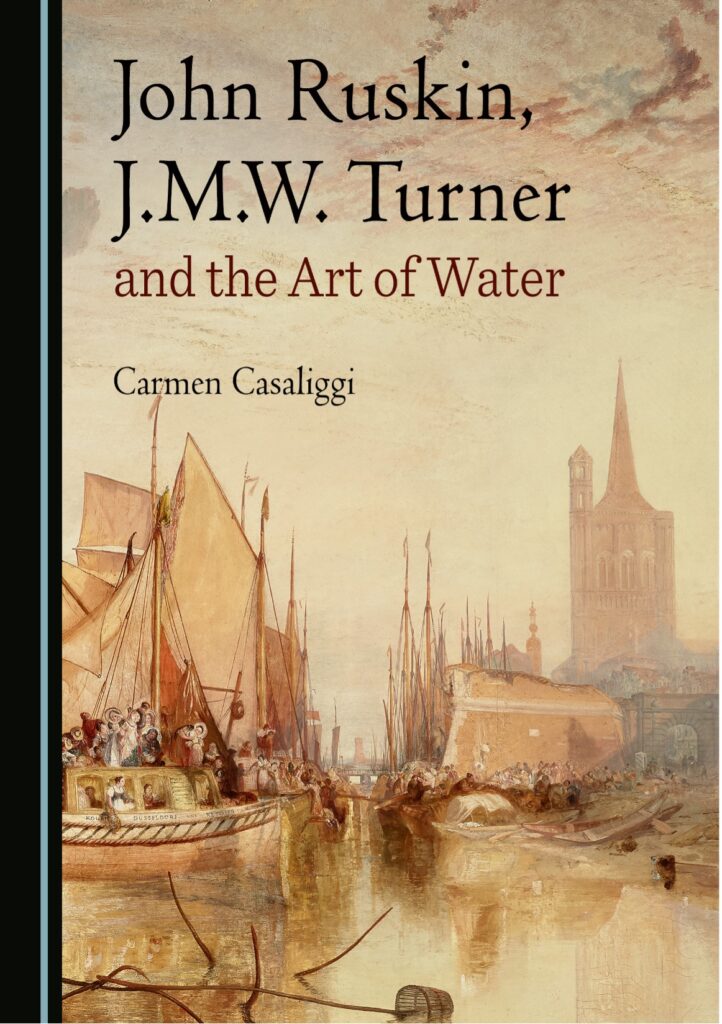
Carmen Casaliggi, 2022. John Ruskin, J.M.W. Turner and the Art of Water (Newcastle: Cambridge Scholars Publishing). ISBN: 1-5275-8823-8. 230 pages.
This book assesses Ruskin’s and Turner’s mutual interest in the theme of water. By considering existing scholarly works on Ruskin and Turner, the book begins by demonstrating that the two, despite their widely acknowledged relations, have rarely been examined in conjunction. It raises the question as to how the subject of water inspired the intellectual, aesthetic, philosophical, and scientific climate of the nineteenth century, both in Britain and abroad, and acknowledges the significance of the relationship between Ruskin and Turner in the context of aquatic studies. Ruskin’s childhood fascination with water is examined in detail, while the scientific and spiritual importance of the subject in Modern Painters and The Stones of Venice is also emphasised and read in parallel with The Harbours of England, a detailed account of which is given, referring to both text and illustrations. Turner’s role in Ruskin’s understanding of specific water-pictures is also reconstructed. The book demonstrates that water is important as a multifaceted compendium of contemporary themes, for tradition, progress, nationalism, and patriotism find their iconography in its depiction.
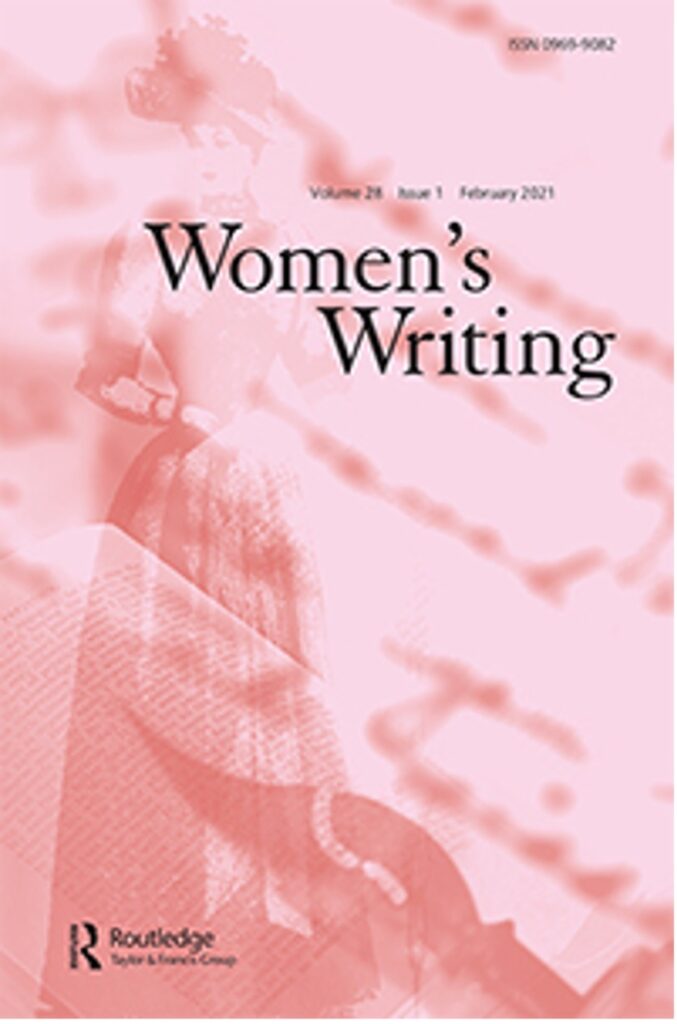
Carmen Casaliggi, 2020. “Domestic Cosmopolitanism in Germaine de Staël’s Coppet and in Corinne: or Italy”, Women’s Writing – Special Issue, Eighteenth-Century Cosmopolitan Endeavours (vol. 27 no. 1) (London and New York: Routledge), 97-112. DOI: 10.1080/09699082.2019.1654182
This essay argues for the intellectual ethos of cosmopolitanism shared in the salon culture of Germaine de Staël’s Enlightenment centre at Coppet and reflects on the overlooked significance of a cosmopolitanism rooted in the host country (i.e. Switzerland) and played out domestically through dialogues and writing. Furthermore, this essay suggests that the cosmopolitan dimension surrounding Coppet acted as an inspiration for Staël’s second novel Corinne, or Italy (1807), a European best-seller which not only sheds light on the society of Napoleonic Europe, but also exposes links between British nationalism and provincialism with Italian cosmopolitanism; Corinne’s multilingual conversations with her cosmopolitan improvisations; and the interplay between the domestic and the cosmopolitan heroine ultimately embodied by the character of the child Juliet.

Carmen Casaliggi (with Porscha Fermanis), 2016. Romanticism: A Literary and Cultural History (London and New York: Routledge). ISBN: 978-0415679077. 260 pages.
Examining the poetry, fiction, non-fiction, drama, and the arts of the period, this book considers: important propositions and landmark ideas in the Romantic period; key debates and critical approaches to Romantic studies; new and revisionary approaches to Romantic literature and art; the ways in which Romantic writing interacts with broader trends in history, politics, and aesthetics; European and Global Romanticism; the legacies of Romanticism in the twentieth and twenty-first centuries. This clear and engaging book is an invaluable resource for anyone who intends to study and research the complexity and diversity of the Romantic period, as well as the historical conditions which produced it.
For further details of Carmen Casaliggi’s writing, see her university web page.
…
…
Dr Kate North
Kate North writes poetry and fiction. Her work interrogates the mutual dependencies of repression and belonging.
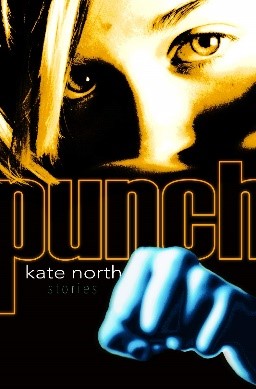
Kate North, 2019. Punch. Birmingham: Cinnamon Press. Short story collection.
The short stories in Punch explore the theme of isolation in 21st Century urban life through character and setting. Through these stories Kate asks how the cultural outsider can exist in relation to both contemporary and historical difference. Characters negotiate past prejudice from within present patriarchal and heteronormative states.
These stories all feature characters who are in various ways ‘other’ yet also accepted within their environments: the tourist, the bullied child, a spy. These characters negotiate acceptance and alienation while questioning the structures and practices that surround them. Many of these stories could be characterised as slipstream, existing in moments where the everyday suddenly becomes unknown.
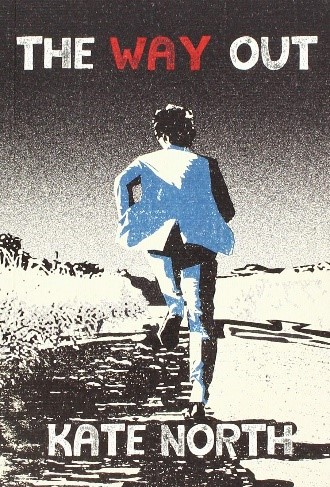
Kate North, 2018. The Way Out. Cardigan: Parthian. Poetry collection.
The enduring theme of this collection is the masking of reality with a particular focus on trauma. It is a collection of poems exploring personal choice in relation to addiction, illness, loss, the body, and loving relationships.
In this collection Kate explore how can the body be represented both culturally and physiologically; how notions of ‘the self’ may be maintained and understood through choice and the lack of it.
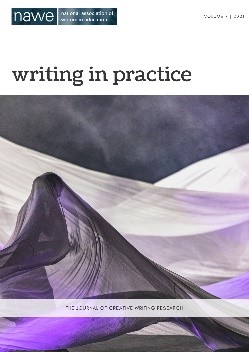
Writing in Practice. Journal.
Kate is Principal Editor of Writing in Practice, a peer-reviewed journal that aims to explore the nature of the art of writing, highlighting current academic thinking and practice, and reflecting on this with an international outlook.
For further details of Kate North’s writing, see her website.
…
…